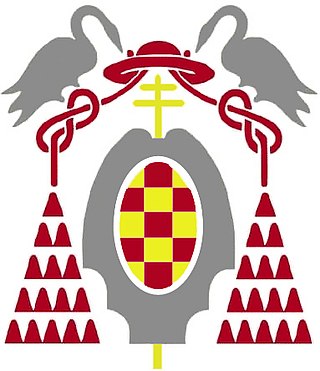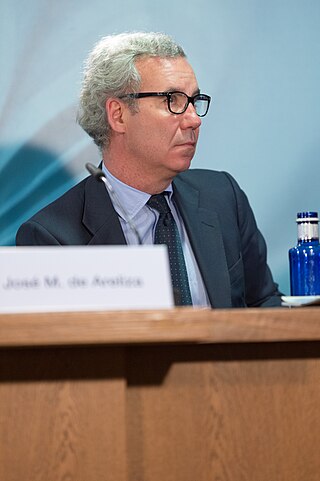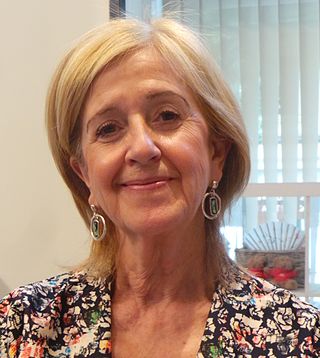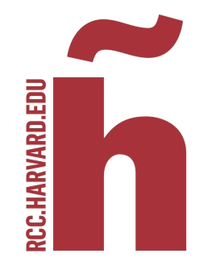
The Complutense University of Madrid is a public research university located in Madrid. Founded in Alcalá in 1293, it is one of the oldest operating universities in the world, and one of Spain's most prestigious institutions of higher learning. It is located on a sprawling campus that occupies the entirety of the Ciudad Universitaria district of Madrid, with annexes in the district of Somosaguas in the neighboring city of Pozuelo de Alarcón. It is named after the ancient Roman settlement of Complutum, now an archeological site in Alcalá de Henares, just east of Madrid.

The University of Seville is a university in Seville, Andalusia, Spain. Founded under the name of Colegio Santa María de Jesús in 1505, in 2022 it has a student body of 57,214, and is ranked 6th among Spanish universities.

The University of Alcalá is a public university located in Alcalá de Henares, a city 35 km northeast of Madrid in Spain and also the third-largest city of the region. It was founded in 1293 as a Studium Generale for the public, and was refounded in 1977. The University of Alcalá is especially renowned in the Spanish-speaking world for its annual presentation of the highly prestigious Cervantes Prize. The university currently enrolls 28,336 students, 17,252 of whom are studying for undergraduate degrees, who are taught by a teaching staff of 2,608 professors, lecturers and researchers belonging to 24 departments. The administrative tasks are carried out by the university's Administration and Services, comprising approximately 800 people.
There are 89 universities in Spain, most of which are supported by state funding. 39 Spanish universities are private, of which 7 are affiliated with the Catholic Church.

The Colegio Imperial de Madrid, also historically known as the Colegio Imperial de la Compañía de Jesús or the Colegio de San Pedro y San Pablo de la Compañía de Jesús en la Corte and now known as the Instituto San Isidro, was the name of a Jesuit educational institution in Madrid, Spain.
The Central American Technological University (Spanish: Universidad Tecnológica Centroamericana) (UNITEC) is a private coeducational institution with campuses in the three main cities of Honduras: Tegucigalpa, San Pedro Sula and La Ceiba.

The Club de Rugby Pozuelo, also known as CRC Pozuelo, is a Spanish rugby union club sited in Pozuelo de Alarcón. The club currently competes in the División de Honor, the top division of Spanish rugby. The senior squad plays its matches at Campo de Rugby Valle de las Cañas.
CEU San Pablo University is a private Catholic university located in Madrid, Spain, with Campuses in Moncloa, Madrid, right next to the Constitutional Court of Spain, and in Montepríncipe, Alcorcón. It is run by the Centro de Estudios Universitarios, established by Asociación Católica de Propagandistas (ACdP) with the goal of making positive changes in society through educational centres, which offer a model based on a holistic understanding of the human person and work in the public arena in defense of justice and human beings.

José María de Areilza Carvajal, Count of Motrico and Count of Rodas, is a Spanish Professor and Jean Monnet Chair at ESADE Business School, Ramón Llull University, Barcelona and Madrid and Secretary General of Aspen Institute España foundation, partner of The Aspen Institute in the USA.

Ciudad Universitaria is an administrative neighborhood of Madrid belonging to the district of Moncloa-Aravaca. It contains and is named after the University City of Madrid, a complex that is home to several universities and various research organizations, including:

Marian Lopez Fernandez-Cao is a Spanish university professor, curator and researcher, specializing in art, feminism, art therapy and social inclusion. Since 1992 she has been a professor in the Universidad Complutense of Madrid, and is expert on the artist Sonia Delaunay.

Samer Hassan is a computer scientist, social scientist, activist and researcher, focused on the study of the collaborative economy, online communities and decentralized technologies. He is Associate Professor at Universidad Complutense de Madrid (Spain) and Faculty Associate at the Berkman Klein Center for Internet & Society at Harvard University. He is the recipient of an ERC Grant of 1.5M€ with the P2P Models project, to research blockchain-based decentralized autonomous organizations for the collaborative economy.

Cecilia Castaño Collado is a PhD in Political Science, professor of Applied Economics, and lecturer at the Complutense University of Madrid's Department of Applied Economics. She is an expert in information technology and its effect on women's employment and work. She has conducted numerous investigations on the digital gender gap and women's access to the information society. In 2006 she created the Research Program on Gender and the Information Society of the Open University of Catalonia (UOC). She has been a visiting researcher at Harvard University, MIT, and UC Berkeley.
Felisa Núñez Cubero was a Spanish physicist. She was the first female professor at the Polytechnic University of Madrid.
The Bachelor's Degree Extraordinary Award, is the official and prestigious university academic award granted annually by each university in Spain to university students who have completed their Bachelor's Degree with the best academic results, the best academic record and with the highest grade point average (GPA) in their class.

The Hospital Universitario 12 de Octubre is a public district general hospital in the neighborhood of Orcasur, in Madrid, Spain. It is part of the hospital network of the Servicio Madrileño de Salud (SERMAS).

The Hospital General Universitario Gregorio Marañón is a public general hospital located at the neighborhood of Ibiza in Madrid, Spain, part of the hospital network of the Servicio Madrileño de Salud (SERMAS).

The Hospital Clínico San Carlos is a hospital located at the Ciudad Universitaria neighborhood in Madrid, Spain, part of hospital network of the Servicio Madrileño de Salud (SERMAS).
María Teresa Miras Portugal was a Spanish scientist, pharmacist, biochemist, molecular biologist and Emeritus professor at the Complutense University of Madrid. She was a member of the Spanish "Real Academia Nacional de Farmacia" and served as President of this Institution from 2007 to 2013, becoming the first female to be elected for this position in a Spanish "Real Academia". She was Honorary President.

The Colegio Menor de San Ciriaco y Santa Paula, popularly known as Colegio de Málaga, is one of the educational centres that made up the former Cisnerian University of Alcalá de Henares, and which currently houses the Faculty of Philosophy and Letters of the University of Alcalá.















